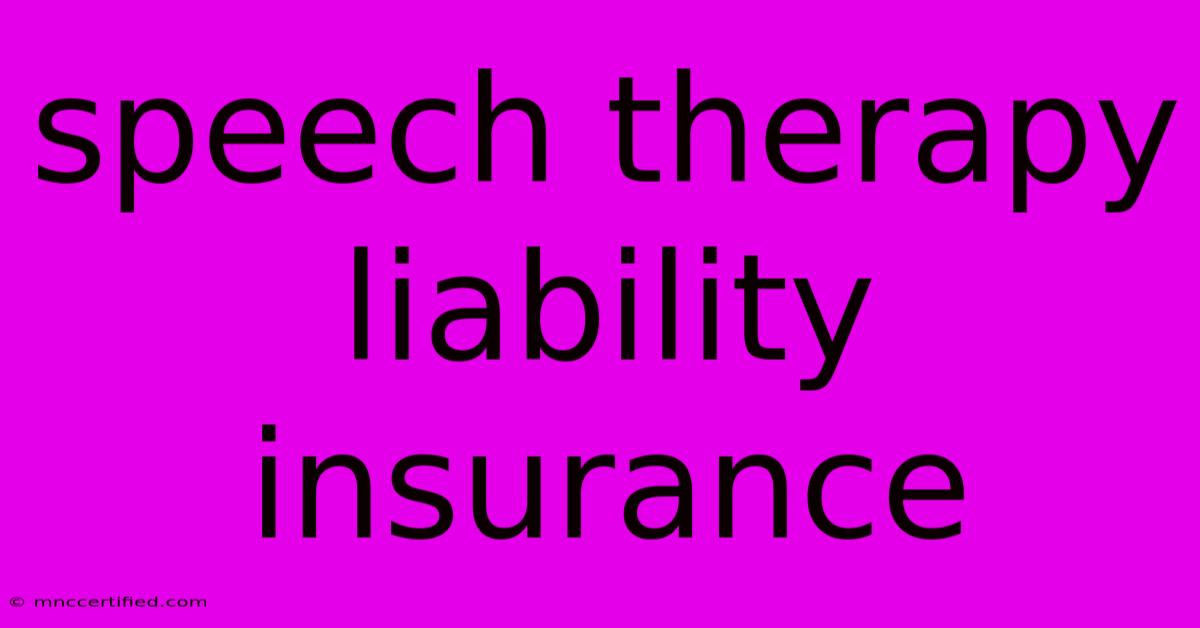Speech Therapy Liability Insurance

Table of Contents
Speech Therapy Liability Insurance: Protecting Your Practice and Your Future
Choosing a career in speech therapy is a rewarding path, dedicated to helping individuals overcome communication challenges. However, alongside the immense satisfaction comes the responsibility of managing potential risks. This is where speech therapy liability insurance becomes crucial. It's not just about protecting your assets; it's about safeguarding your reputation and ensuring the continued success of your practice.
Understanding the Risks Faced by Speech Therapists
The work of a speech-language pathologist (SLP) involves close interaction with clients, often children or individuals with disabilities. This inherently carries a degree of risk. Potential liabilities could arise from various scenarios, including:
- Allegations of Negligence: A claim could be made if a client or their family believes your treatment was inadequate or caused harm. This could range from minor issues to serious allegations of malpractice.
- Accidents and Injuries: Depending on your setting (e.g., working with children in a school or clinic), accidents can happen. Liability insurance can cover costs associated with injuries sustained during therapy sessions.
- Breach of Confidentiality: Protecting client privacy is paramount. A data breach or accidental disclosure of sensitive information can lead to legal ramifications and financial burdens.
- Professional Misconduct: Claims of unethical behavior or unprofessional conduct can damage your reputation and lead to costly legal battles.
These are just some examples, highlighting the multifaceted nature of the potential risks inherent in this profession. Having comprehensive speech therapy liability insurance is not an optional luxury; it's a necessary safeguard.
Types of Liability Insurance for Speech Therapists
Several types of liability insurance can protect your speech therapy practice. Understanding the differences is key to choosing the right coverage:
1. Professional Liability Insurance (Malpractice Insurance):
This is the cornerstone of coverage for speech therapists. It protects you against claims of negligence, errors, or omissions in your professional services. This is arguably the most important type of insurance for your practice.
2. General Liability Insurance:
This covers bodily injury or property damage that occurs on your premises or as a result of your operations. This could include a client tripping and falling in your office.
3. Errors and Omissions Insurance:
While often overlapping with professional liability, errors and omissions insurance specifically focuses on mistakes or oversights in your administrative duties, such as billing errors or missed deadlines.
4. Cyber Liability Insurance:
In our increasingly digital world, this is crucial for protecting your practice against data breaches and cyberattacks that could expose client information.
Choosing the Right Speech Therapy Liability Insurance Policy
Selecting the right policy involves careful consideration of several factors:
- Coverage Limits: Determine the appropriate amount of coverage to protect your assets adequately. Consider the potential costs of legal fees, settlements, and judgments.
- Claims Process: Understand the insurer's claims handling process. Look for a company with a reputation for responsive and efficient service.
- Policy Exclusions: Carefully review the policy's exclusions to understand what situations are not covered.
- Premium Costs: Compare premiums from different insurers to find a balance between cost and coverage. Don't sacrifice adequate protection for a slightly lower premium.
- Professional Associations: Check if your professional association offers group insurance programs, which often provide discounted rates.
Protecting Your Career: Beyond Insurance
While insurance provides a crucial safety net, proactive risk management is equally important:
- Maintain Accurate Records: Meticulous record-keeping is vital to demonstrate due diligence and defend against potential claims.
- Obtain Informed Consent: Always obtain informed consent from clients before starting treatment.
- Continuously Update Your Skills: Stay current with best practices and advancements in speech therapy to minimize the risk of errors.
- Seek Supervision When Needed: Don't hesitate to seek supervision or consultation from experienced colleagues when facing challenging cases.
In conclusion, securing the right speech therapy liability insurance is a non-negotiable aspect of running a successful and ethical practice. By understanding the risks, choosing appropriate coverage, and implementing proactive risk management strategies, you can protect your career, your reputation, and your financial well-being. Remember to consult with an insurance professional to determine the best policy for your specific needs and circumstances.

Thank you for visiting our website wich cover about Speech Therapy Liability Insurance. We hope the information provided has been useful to you. Feel free to contact us if you have any questions or need further assistance. See you next time and dont miss to bookmark.
Featured Posts
-
Craig Melvin Replaces Hoda Kotb On Today
Nov 15, 2024
-
Phi Phi Island And James Bond Tour
Nov 15, 2024
-
Pakistan Vs Australia T20 Highlights
Nov 15, 2024
-
Greece Vs England Three Lions Secure Victory
Nov 15, 2024
-
Argentina Vs Paraguay Messi Struggles Ratings
Nov 15, 2024